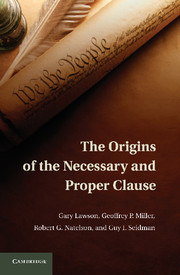Book contents
- Frontmatter
- Contents
- Acknowledgments
- 1 Raiders of the Lost Clause
- 2 Discretionary Grants in Eighteenth-Century English Legislation
- 3 An Ocean Away
- 4 The Legal Origins of the Necessary and Proper Clause
- 5 The Framing and Adoption of the Necessary and Proper Clause
- 6 Necessity, Propriety, and Reasonableness
- 7 The Corporate Law Background of the Necessary and Proper Clause
- Index
4 - The Legal Origins of the Necessary and Proper Clause
Published online by Cambridge University Press: 03 May 2011
- Frontmatter
- Contents
- Acknowledgments
- 1 Raiders of the Lost Clause
- 2 Discretionary Grants in Eighteenth-Century English Legislation
- 3 An Ocean Away
- 4 The Legal Origins of the Necessary and Proper Clause
- 5 The Framing and Adoption of the Necessary and Proper Clause
- 6 Necessity, Propriety, and Reasonableness
- 7 The Corporate Law Background of the Necessary and Proper Clause
- Index
Summary
A key to the Necessary and Proper Clause is the founding generation's conviction that government officials ought to conform their conduct to the rules governing private fiduciaries. Also important is the specific content of those rules as they existed at the time. Our conclusion is that the Necessary and Proper Clause granted Congress powers incidental to the powers elsewhere granted in the Constitution, to be exercised in accordance with fiduciary principles – and in particular, in accordance with the principles of agency. The remainder of this book explains and defends that conclusion.
Numerous extant eighteenth-century documents reflect both fiduciary law and the belief that government should conform to fiduciary standards. Although many British statutes contained language similar to that in the Necessary and Proper Clause, British statutes were far less influential on the American public than other kinds of instruments by which one person or other granted power to another.
This chapter first documents the widespread founding-era conviction that government officials are, or should be, subject to fiduciary standards. Next, it focuses on one aspect of founding-era agency law: the doctrine of incidental powers. It then identifies some of the adjectives that accompanied power grants during the two centuries prior to the founding and explains their relationship to the incident power doctrine. Finally, it compares different forms of power-granting clauses available to eighteenth-century drafters and locates the Necessary and Proper Clause within this universe.
- Type
- Chapter
- Information
- The Origins of the Necessary and Proper Clause , pp. 52 - 83Publisher: Cambridge University PressPrint publication year: 2010
- 1
- Cited by

